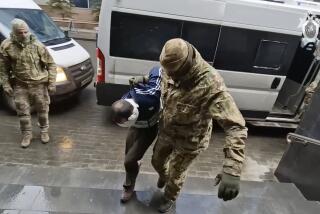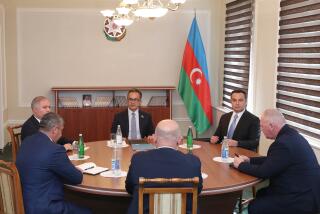Ousted Leader’s Supporters Seize Control in Tajikistan
- Share via
MOSCOW — Insurgents seeking to restore Tajikistan’s hard-line president to office seized power in Dushanbe on Saturday, storming the presidential palace and declaring they will not allow the Central Asian country to be ruled by Islamic fundamentalists.
Although heavy fighting continued into Saturday night in the Tajik capital, the militants from the southern region of Kulyab appeared successful in their bid to reverse last month’s ouster of longtime Communist leader Rakhman Nabiyev.
Kulyab leaders said they intend to reinstate Nabiyev and the conservative ruling council that governed until May and to call Parliament into extraordinary session to “restore legality.” But the countercoup did not appear to move the impoverished former Soviet republic of 5.2 million any closer to resolving months of civil strife believed to have killed thousands of people.
In Washington, the State Department said it is closing the U.S. Embassy in Tajikistan because of the fighting and is recommending that U.S. citizens “depart the country as soon as possible.”
Spokeswoman Julie Reside said the embassy reported that 18 U.S. citizens known to be in the republic, including 11 U.S. government officials, were safe.
The U.S. ambassador in Dushanbe reported “heavy fighting around the hotel which houses the embassy, including tank and machine-gun fire,” Reside said.
She added that Washington has seen reports that pro-Nabiyev forces gained control of important centers in the Dushanbe but that the balance of power in the republic was not clear.
Observers in Moscow and Dushanbe now say that the conflict threatens to become as bloody and intractable as the war that devastated Afghanistan, Tajikistan’s neighbor to the south. And leaders in neighboring Central Asian states worry aloud that Tajikistan’s strife could spread to other parts of the largely Muslim region.
Kulyab leader Safarali Kenjayev told Tajik citizens in a broadcast address that the coalition of Islamic and reformist politicians who had replaced Nabiyev served as “a marionette government with Islamic fundamentalists behind it.” Kenjayev and his allies promised a secular government with full constitutional rights.
“We do not lay (permanent) claim to power,” he told Russia’s Itar-Tass news agency. “We have come here to stop the bloodshed and restore the legality that was trampled upon by Islamic fundamentalists in May under pressure of the opposition.”
But Tajikistan’s unrest does not break down so easily into a dispute between religious and secular leaders. The anti-Nabiyev coalition has denied that it sought Iran-style Islamic rule, and the former republic is actually caught up in a complex battle of clans and regions as well as of parties. The unrest is fueled by shortages of land, jobs and food in what was the poorest of the old Soviet republics.
Military analysts say that Tajikistan’s proximity to Afghanistan has also helped inflame the conflict as arms flood across the leaky border and experienced Afghan moujahedeen --Muslim resistance fighters--try to help and instruct their Islamic brethren.
According to sketchy reports from the region, Saturday’s attack began at about 6 a.m. when hundreds of Kulyab-faction fighters moved on Dushanbe and, encountering little resistance, took over the presidential palace, the Parliament building, the offices of the nation’s religious leader, the airport, railway stations and communications.
By Saturday evening, residents reported that they could still hear shooting in the streets, and news agencies said that local battles in Dushanbe neighborhoods continued. The Interfax news agency reported an apparently unsuccessful attempt by anti-Nabiyev forces to retake the presidential palace using grenade launchers.
“There’s so much shooting, I’m too afraid to go out of my apartment and see what’s going on,” a local resident, contacted by phone, answered when asked about the situation in Dushanbe. The coalition forces of Islamic and liberal parties were said to be regrouping about 20 miles from Dushanbe and awaiting busloads of supporters from other parts of Tajikistan.
Akbarsho Iskandarov, who had been acting president, was reported to be holed up in the Interior Ministry building. Nabiyev’s whereabouts remained unclear. He had resigned under pressure when hundreds of hostile Tajiks surrounded the airport Sept. 7 as he was waiting for a plane. Later, he complained about being forced to quit.
Apparently sensing trouble, Iskandarov had declared a state of emergency Friday night and imposed a nighttime curfew. Interfax said he had tried to gather the parliamentary leadership to confer but failed.
Saturday night, Iskandarov was reported to be preparing an appeal to the people of Tajikistan and to the Commonwealth of Independent States, apparently a request for peacekeeping troops.
The Russian Foreign Ministry, warning of the danger of escalation, called for an immediate cease-fire in Tajikistan and a start to peace talks.
Times staff writer Matthew Marshall, in Washington, contributed to this story.
More to Read
Sign up for Essential California
The most important California stories and recommendations in your inbox every morning.
You may occasionally receive promotional content from the Los Angeles Times.













